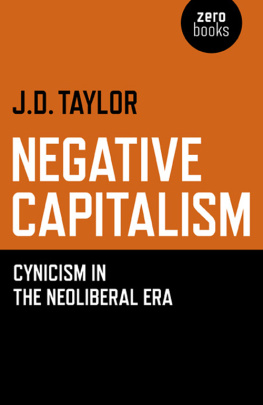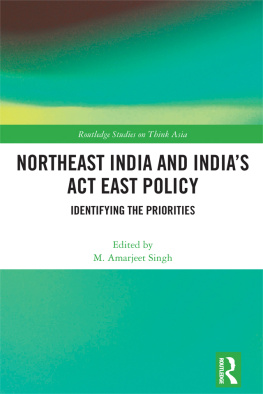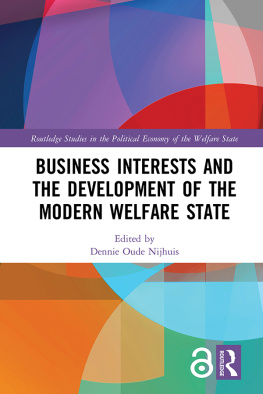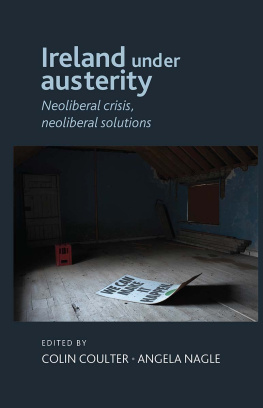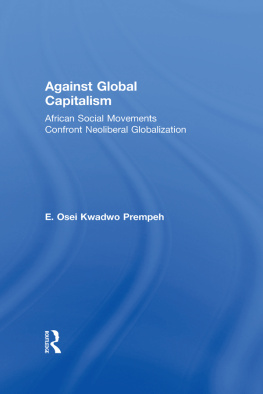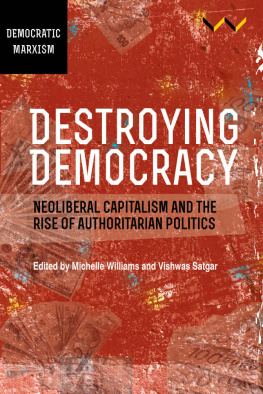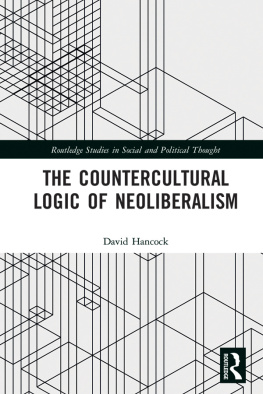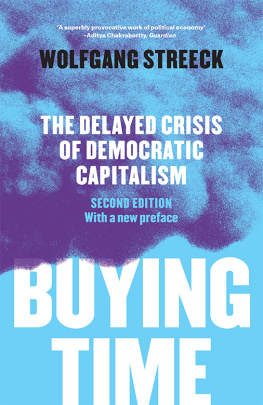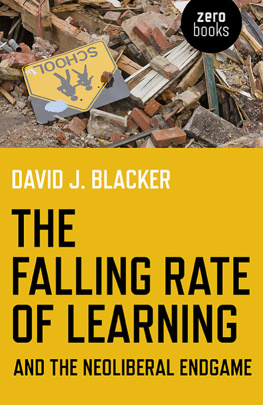Taylor - Negative capitalism - cynicism in the neoliberal era
Here you can read online Taylor - Negative capitalism - cynicism in the neoliberal era full text of the book (entire story) in english for free. Download pdf and epub, get meaning, cover and reviews about this ebook. year: 2013, publisher: John Hunt Publishing, genre: Politics. Description of the work, (preface) as well as reviews are available. Best literature library LitArk.com created for fans of good reading and offers a wide selection of genres:
Romance novel
Science fiction
Adventure
Detective
Science
History
Home and family
Prose
Art
Politics
Computer
Non-fiction
Religion
Business
Children
Humor
Choose a favorite category and find really read worthwhile books. Enjoy immersion in the world of imagination, feel the emotions of the characters or learn something new for yourself, make an fascinating discovery.
Negative capitalism - cynicism in the neoliberal era: summary, description and annotation
We offer to read an annotation, description, summary or preface (depends on what the author of the book "Negative capitalism - cynicism in the neoliberal era" wrote himself). If you haven't found the necessary information about the book — write in the comments, we will try to find it.
Taylor: author's other books
Who wrote Negative capitalism - cynicism in the neoliberal era? Find out the surname, the name of the author of the book and a list of all author's works by series.
Negative capitalism - cynicism in the neoliberal era — read online for free the complete book (whole text) full work
Below is the text of the book, divided by pages. System saving the place of the last page read, allows you to conveniently read the book "Negative capitalism - cynicism in the neoliberal era" online for free, without having to search again every time where you left off. Put a bookmark, and you can go to the page where you finished reading at any time.
Font size:
Interval:
Bookmark:


First published by Zero Books, 2013
Zero Books is an imprint of John Hunt Publishing Ltd., Laurel House, Station Approach,
Alresford, Hants, SO24 9JH, UK
www.johnhuntpublishing.com
www.zero-books.net
For distributor details and how to order please visit the Ordering section on our website.
Text copyright: J. D. Taylor 2012
ISBN: 978 1 78099 260 0
All rights reserved. Except for brief quotations in critical articles or reviews, no part of this book may be reproduced in any manner without prior written permission from the publishers.
The rights of J. D. Taylor as author have been asserted in accordance with the Copyright,
Designs and Patents Act 1988.
A CIP catalogue record for this book is available from the British Library.
Design: Stuart Davies
Printed and bound by CPI Group (UK) Ltd, Croydon, CR0 4YY
We operate a distinctive and ethical publishing philosophy in all areas of our business, from our global network of authors to production and worldwide distribution.
Each of us lives in an era where our social lives are determined by financial capital. The scale of debts owed collectively to invisible and unknown creditors is the pretext for increased demands for productivity and consumption, in exchange for vastly increasing living costs, rents, and reductions in social securities and real wages. Each of us has little agency or control over these circumstances, whilst distant banks and an aloof and privately-educated political class intensify their control and management over our everyday lives. Everything (and everyone) begins to break down under the pressure of being a productive consumer, anger and dissent are internalised, self-inflicted, erupting momentarily, whilst a discredited neoliberal political ideology and caste of financial capitalists increase their priva- teering enclosure of public wealth by the day. This is an era of negative capitalism, where ones individual and collective capabilities and quality of life are steadily diminished and disempowered by financial capital. This negation of individuals into economically productive behaviours represents, in the second decade of the 21st century, a new kind of era, with specific disorders (depression, anxiety), specific devices (the internet, smart-phone, and laptop) and a new cultural feeling (cynicism).
The argument here is that many singular discontents with financial capitalism can be understand within a wider process of negation, a process of disempowerment embedded in financial capitalism and primarily transmitted through a corruption of language, and hence thought. To explain this new framework, Ill outline what neoliberalism is in theory and practice, what I mean by negative capitalism, and how this analysis fits into existing accounts of capitalism, before using the bulk of the work to explore specific symptoms of negativity and the peculiar cynicism of the contemporary era. There is no we here. No shoulds or woulds. I wont insult the readers intelligence by claiming that theres a coming change on the horizon, if everyone waits a little longer, or that theres a magical solution here thats never been considered before, a cipher that when uttered transforms everything irredeemably anew. I am 24 years old, a worker and a graduate without a future, and I do not write from a position of academic, social or political privilege: my only stake in financial capitalism is a five figure debt. I am profoundly angry and depressed by what I see around me, but I am also hopeful that a new era can be created by this generation, provided the blurry errors of history, cynicism and individualism can be traded in for strategy and a new social democracy, underlined by a revolution of citizens in law and constitution.
This work differs from other recent analyses, which have often focused on one singular aspect of late capitalism, by offering an overarching framework for understanding the problems of the contemporary era in terms of negation a collective disempow-erment of the public by financial capitalism. It goes ahead and describes specific strategies to challenge negative capitalism and create a counter-politic of social democracy. I make this kind of incautious and bold analysis in order to foment public debate regarding strategy. There is an abundance of nuanced and theoretically subtle arguments that fail to engage an enraged socially-democratic public on its own terms. Therefore this work aims to challenge both the informed reader and the new reader of political philosophy. The work aims to detail the scale of the problem: negative capitalism and its existential costs, and the cultural effects of cynicism. Rather than reel off just a utopian fairy-world of what and why, the intention here is to focus additionally on how, on strategy. I do not claim to know how exactly we all should live, or that we all (assuming that all of you already agree with me, another conceit to avoid) should act or behave in one way or another. The aim is to stimulate response with a series of wild, occasionally arrogant and deliberately inflammatory arguments. The argument does offer a solution to the problems of negative capitalism what is described here as social democracy but this concept is offered to provoke discussion above all else. Cynical passivity is the problem. Nothing less than a basic quality of life is the prize and the end.
What is Negative Capitalism?
When was the last time you had a couple of days of just relax- ation, without the pretext of a holiday, which didnt involve checking emails, buying things, or guiltily trying to catch up with undernourished relationships? When did you last get through a month without having to borrow even more money so that you could actually eat, meet your rent payment and afford public transport? Can you recall the last Monday or Tuesday you got through where you didnt at one point experience a feeling of fairly moderate terror and anxiety during the daily email bombardment? In an era of negative capitalism, life itself becomes negated and alienated from its sources of happiness and social support. Relaxation is accompanied by guilt. Debt becomes a social and political condition.
Since 2010 the political terrain of the UK has irreversibly shifted, hence the necessity of writing about these problems now under a wider conceptual framework of negation. Anger against the capitalist Real has erupted with small but symbolically powerful successes. Many working-class and underclass young people in British urban areas have demonstrated that they feel they have no stake in their communities, demonstrated in the violence inflicted on their own alienated communities and on colonising chainstores during the August 2011 riots. Meanwhile young middle-class graduates have been similarly disinherited by the lack of any real forms of sustainable employment in the country, with similarly abortive strikes of anger against police, parliament university authorities in a continued wave of local and national actions since 2010. In the second decade of the 21st century, pain, depression and rage in urban communities is tangible. Yet the neoliberal project of privatising public wealth has accelerated to include healthcare, education and the police-force, leaving perhaps only the armed forces and judiciary acting only in the apparent interests of the public. So why hasnt all this deprivation, cuts and growing inequality, in the face of an increasingly arrogant financial culture in the City, not led to a violent overthrow of the political class, or even any nascent organised oppositional movement?
Font size:
Interval:
Bookmark:
Similar books «Negative capitalism - cynicism in the neoliberal era»
Look at similar books to Negative capitalism - cynicism in the neoliberal era. We have selected literature similar in name and meaning in the hope of providing readers with more options to find new, interesting, not yet read works.
Discussion, reviews of the book Negative capitalism - cynicism in the neoliberal era and just readers' own opinions. Leave your comments, write what you think about the work, its meaning or the main characters. Specify what exactly you liked and what you didn't like, and why you think so.

